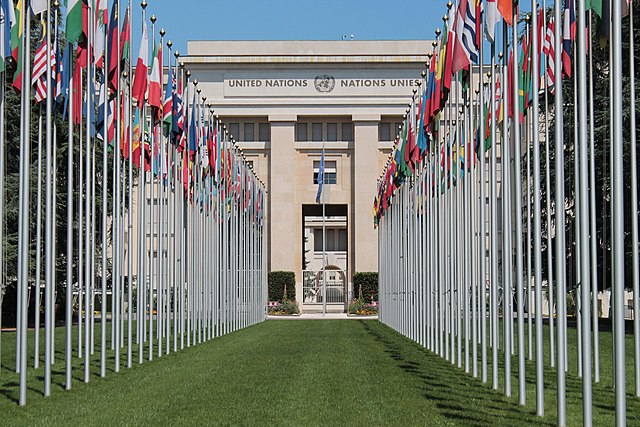In times of war, the United Nations has its hands tied
International affairs have always been characterised by chaos. Claims otherwise are steeped in Western-centric narratives about which chaos, where, matters. The globe does not stop at the Mediterranean Sea nor the Eurasian Steppe, and those times heralded as eras of global stability tended to be anything but; the Cold War burned hot in Korea, Vietnam, Afghanistan, Nicaragua, Angola, and so on.
Nonetheless, it is true that the world is experiencing generational turmoil. For the first time since World War II, a territorial war of conquest is underway in Europe, and while the fighting in Gaza, to paraphrase UN Secretary-General, António Guterres, has not come from a vacuum, the scale and extent of the Israeli response has rocked the Middle East more deeply than anything since the Lebanon wars in the 1980s. Massive Western and Western-backed invasions and catastrophic pretences to regime changes have shattered other Middle Eastern countries such as Libya, Iraq, Syria, Yemen, and Afghanistan, and shattered nations are unstable. They can be desperate and swing to vicious ideologies which are perversions of the peace after which they name themselves. Not least from the perspective of energy security, a regional war here would shape the rest of the century.
The issue lies in the construction the Security Council
Where is the UN in this? Well, the institution has seen dizzying successes and crushing failures. Its aid programmes have freed millions from poverty and educated millions more. It has been on the wrong side of history in Rwanda and Darfur. But when it comes to the hard problems of international relations, those of war and peace, it is an institution of contradiction. Israel’s war on Gaza is the most fashionable example of the geopolitics which gums up the UN system, but it is the norm, not the exception.
The issue lies in the construction of the Security Council. The only one capable of passing legally binding resolutions and legitimising the exercise of hard power, bombs, and bullets, is the most powerful organ of the UN. Not even sanctions can be implemented without the assent of the UNSC (United Nations Security Council). It is also the most dysfunctional. For a resolution to pass, nine of the ten members must vote for it, including the five permanent members – the P5. These are China, France, Russia, the UK, and the US. These P5 states all possess a veto which they may exercise without justification. If a single veto is cast, the resolution crumbles. This pattern has characterised the majority of the UNSC’s history. Rather than operating as an impartial and cooperative institution, it is beholden to the petty competing geostrategic interests of the P5.
It makes sense to talk about Israel here, as nearly half of all US vetoes deployed since 1945 have been to protect the country from resolutions critical of its occupation of Palestinian land and its barbarous treatment of the Palestinian people. On the back of the recent ICJ (International Court of Justice) ruling, earlier this week Algeria drafted a UNSC resolution demanding an immediate ceasefire between Israel and Hamas (although it does not technically have any legal jurisdiction over the terrorist group). This will be vetoed by the US, if the Algerians even bother bringing it to the council. But equally, the UNSC has failed to call out China’s human rights abuses against Uyghur Muslims and other Turkic communities in Xinjiang. In the event of a future Chinese invasion of Taiwan, the UNSC would remain mute. It never issued a resolution condemning Russia’s illegal invasion of Ukraine nor its pro-Assad intervention in the 2015 Syrian Civil War.
We can and should expect better from the democracies
The structure of the UNSC condemns it to impotence. The resolutions of the General Assembly, or the rulings of the ICJ, have no teeth. They cannot be enforced without the UNSC’s approval.
But this does not mean that they do not matter. The United Nations remains a unique and uniquely powerful institution. It houses the world’s highest court. It has coordinated international cooperation inconceivable in the early twentieth or nineteenth centuries. And the diplomatic pressure it enables small powers to exert may yet bear fruit.
Patience for Joe Biden’s unqualified support for Israel is wearing thin. He is being put under huge pressure to acknowledge what seems clear to those for whom Israel does not constitute the fulcrum of Middle East policy – not least Algeria and South Africa – as well as from home. The rulings of the ICJ and resolutions of the General Assembly have galvanised citizens to demand better from their leaders. Similarly, in the UK we have seen Muslim support for the Labour Party collapse because of Keir Starmer’s handling of the crisis. Foreign policy is coming home, and the sheer stature of the United Nations as an embodiment of the belief that things should and can be better has played a huge role in that.
Even if the US and its allies defer, it is hard to imagine a similar popular groundswell forcing the more authoritarian members of the P5 to compromise. But we should, and can, expect better from the democracies. I will not be surprised if the dysfunctionality built into its DNA means that the United Nations’ reputation is forever shattered. But this is one attempt at civilisation that I do not wish to see buried by the Middle Eastern sands.

Comments